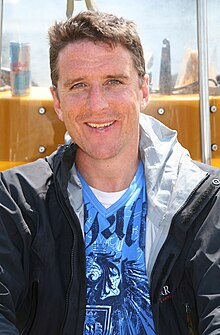Loading AI tools
Welsh nature observer, author and television presenter From Wikipedia, the free encyclopedia
Iolo Tudur Williams (/ˈjɒloʊ/; Welsh pronunciation: ['jɔlɔ]; born 22 August 1962) is a Welsh ornithologist, nature observer, television presenter and author, best known for his BBC and S4C nature programmes, working in both English and his first language of Welsh. After a 14-year career with the RSPB, in 1999 Williams became a full-time TV presenter. He has written a number of books about the natural world.
Iolo Williams | |
|---|---|
 Williams in 2008 | |
| Born | 22 August 1962 Builth Wells, Breconshire, Wales |
| Nationality | Welsh |
| Education | Llanfyllin High School |
| Occupations |
|
| Years active | 1997–present |
| Employers | |
| Known for | Wildlife presenter |
| Spouse | Ceri Williams |
| Children | 2 sons, Dewi and Tomos |
| Website | www |
Williams was born in Builth Wells, Breconshire, but his family moved to Pembrokeshire, before moving to Montgomeryshire, when he was aged five, to live in Llanwddyn near Lake Vyrnwy.[1] Educated at Llanfyllin High School, after gaining two A-Levels in Biology and French, he almost joined the British Army but instead went to the North East London Polytechnic (now the University of East London), graduating with a degree in Ecology.[1]
After graduation, Williams worked on a farm and then in the timber trade, before joining the Royal Society for the Protection of Birds (RSPB) in 1985, staying for 14 years working in the field and as a regional co-ordinator. This led to his making regular appearances in the media, making a name for himself as a leading expert on Welsh bird life.[1]
In 1997 he made Visions of Snowdonia with BBC Wales, which followed the lives of six people living and working on the slopes of the country's highest mountain. After making a second series, in 1999 Williams decided to leave the RSPB and pursue a full-time career in the media.[1]
In 2007 he presented Canals of Wales with Iolo Williams, a five-part series looking at the canals of Wales.[2] In 2008 he presented another series focusing on the Welsh landscape, Iolo's Natural History of Wales.[3]
Williams presented Rugged Wales, which aired on BBC Two on 13 and 20 March 2012. In 2013 he presented Iolo's Great Welsh Parks,[4] and in 2015 he presented a second series of the programme. He continued to present series for the BBC which focused on his native Wales, presenting The Brecon Beacons in 2016, then a third series on great Welsh parks. He continued to showcase Welsh wildlife by presenting Iolo's Snowdonia in 2018.[5] The same year saw him travel to Australia to film Wonders of the Great Barrier Reef.[6]
In 2019 Williams became a regular presenter on Winterwatch, Springwatch and Autumnwatch on BBC Two. In 2020 he presented Iolo: The Last Wilderness of Wales, about the wildlife of the Cambrian Mountains.[7] In 2021 he presented a four-part personal view of the natural world of Pembrokeshire in Iolo's Pembrokeshire.[8] In 2023, the BBC aired Iolo's Borderlands, a four-episode series presented by Williams about the wildlife of the Welsh Marches.[9]
In 2007 Williams was awarded an honorary fellowship of Bangor University.[10] He received further honorary fellowships from Aberystwyth University in 2015[11] and the University of South Wales in 2017.[12]
Williams and his wife Ceri live near the town of Newtown, Powys.[13] The couple have two sons (Dewi and Tomos);[1] and had two rescue dogs, Ianto and Gwen, who have both appeared in some of his television series.[14]
Known for frequently wearing shorts for his work, he has, as a result, become a Welsh cult gay icon.[13]
Williams and his wife have built a fully-insulated timber-framed home. They have a wildlife garden, and grow their own vegetables. They compost all their food waste, and recycle everything else, whilst always eating organic and local produce. As a result of this, in a 2011 World Wide Fund for Nature survey of carbon footprints of ecology personalities, Williams and his family were found to have a low rating of 1.81, compared to a Welsh average of 3.0.[14]
Williams offered his support to a Welsh independence march in 2022.[15]
Seamless Wikipedia browsing. On steroids.
Every time you click a link to Wikipedia, Wiktionary or Wikiquote in your browser's search results, it will show the modern Wikiwand interface.
Wikiwand extension is a five stars, simple, with minimum permission required to keep your browsing private, safe and transparent.